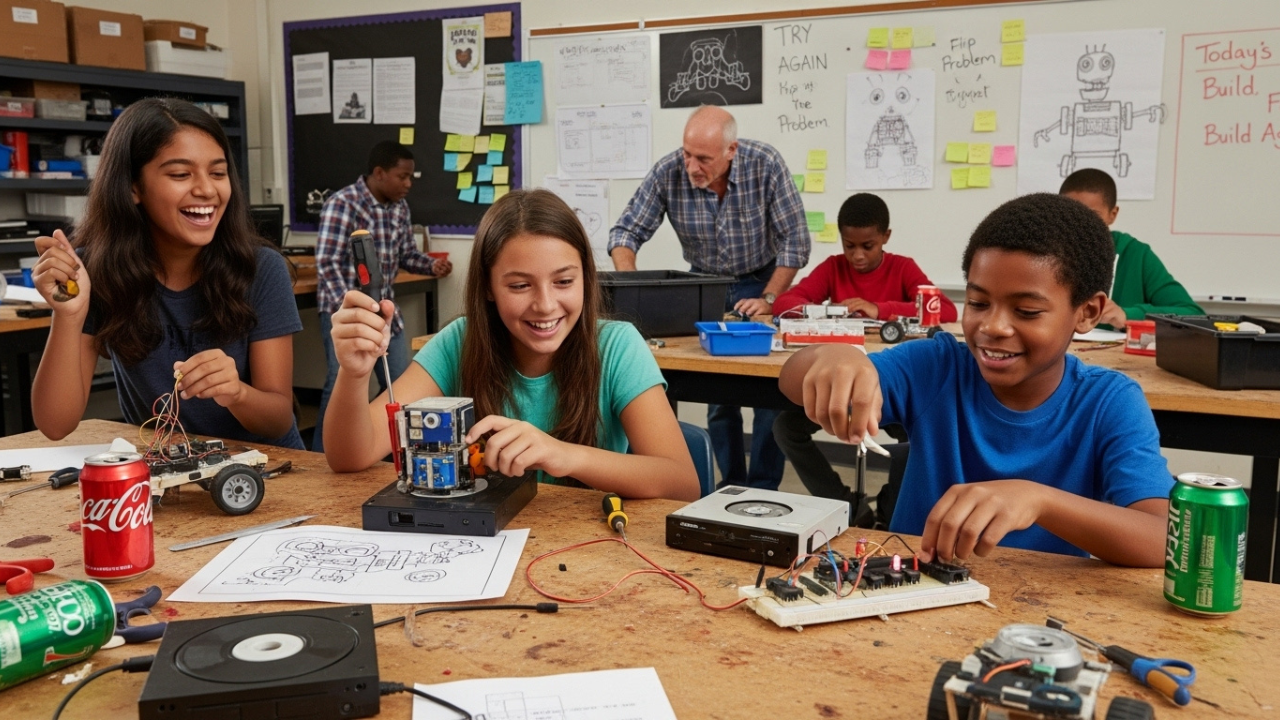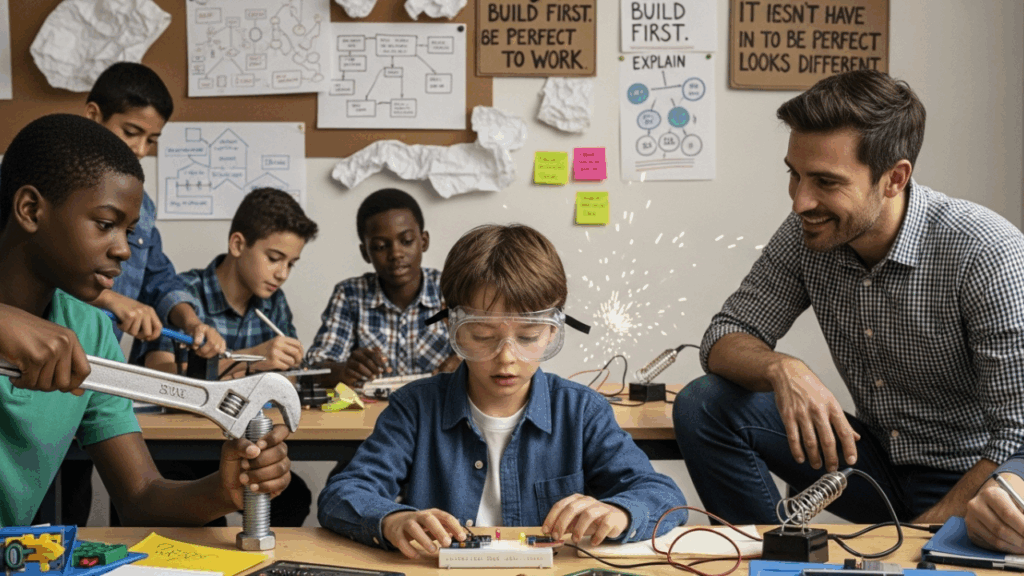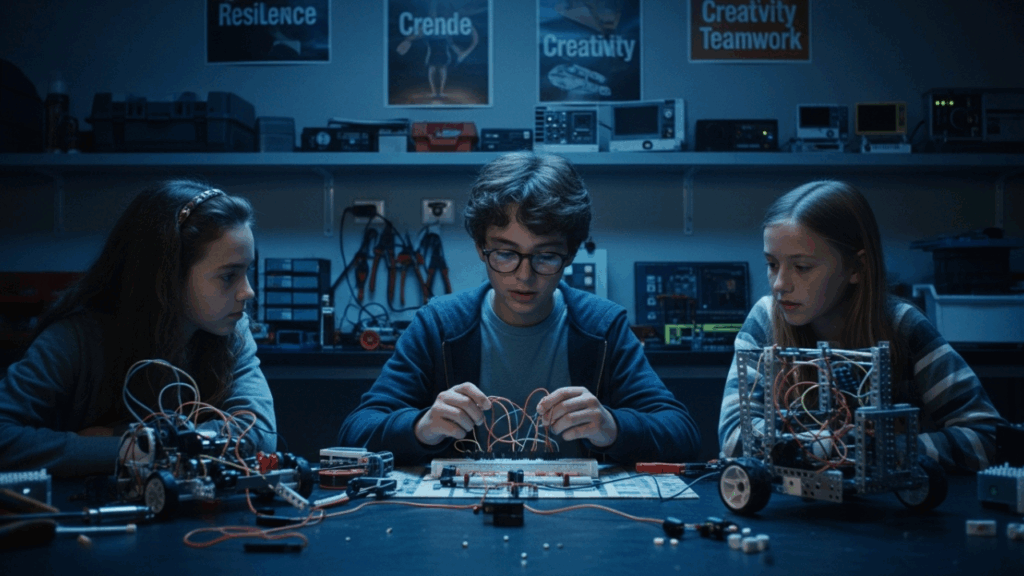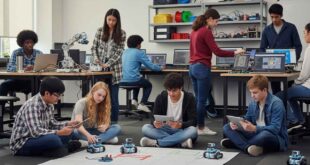People always say a teacher conference can feel a bit like talking into a whiteboard. Still, one random chat in downtown Pittsburgh sent a spark flying, and I couldn-t shake it. Somebody, probably half-joking, bragged that a crew of students had cobbled together a robot out of spare parts and whatever tools the Mr Roboto Project had rattled into the room that morning.
At first I pictured an after-school hobby club huddled in a dusty basement between algebra and detention. What I missed, until the story pulled me back again and again, was that the same DIY spirit was nudging whole schools toward brighter, bolder ideas about science and self-trust.
Key Takeaways
- Mr Roboto sneaked serious robotics into the city-s classrooms even when budget lines threatened to snooze.
- Students drive the builds, grown-ups guide the scratches, and confidence rises with every stubborn circuit that finally blinks.
- Mistakes aren-t failures here; they-re just the next mystery to crack, so math, history, and lunch all feel less scary when the bell rings.
- Kids who usually drift know, for maybe the first time, that their hands can outrun the words on a test.
- You don-t need Hollywood gear, just a room, some leftover bits, and a big pile of trust. Anywhere there-s belief in what a kid can touch, the model can roll out.
How It Slipped Into Classrooms Without Flashy Headlines
The Mr Roboto Project never staged red-carpet reveals and certainly avoided chattering influencers.
Instead, it bubbled up from people who figured every kid-deserving and undeserving-could really build, bang on, and mangle real stuff.
What got passed around during those early weeks looked like a yard-sale collage-drives scavenged from retired computers and half-written manuals nobody missed. Think odd cables and dusty circuit boards.
Lesson guides were often scribbled on coffee-stained napkins, and the teachers leaning over them included painters, bicycle mechanics, and neighborhood fans who just loved tinkering. Overlooked by trade journals, the breakout moment crept into classes anyway.
Why Mr Roboto Resonated With Teachers and Kids Alike
The truth is perfect study guides dont fit every brain. Some kids pick up a heavy wrench and suddenly get what torque never explained.
Others dont catch code syntax until a blinking LED lights up in front of them. That realtime flash is exactly what vaulted the Mr. Roboto Project beyond standard lessons.
The initiative never demanded that students think like machines, yet it dropped real machines into their laps. Sparks flew somewhere far outside the scope of a textbook.
Teachers noticed the mood shift overnight. Shy kids who rarely mumbled a word began peppering adult mentors with why questions, and a single suggestion bloomed into wild brainstorms.
A Quiet Boost to Schools That Needed It Most
One middle-school principal bragged that the only five nerdy engineers in her robotics club morphed into a loud, proud extracurricular backed by parents and a wary school board.
Their shiny shelf may never host a national trophy, but the kids pocketed something far cooler-engagement. The pure thrill of winning an argument, then building the proof, turned homework into permission to play out loud.
A few weeks ago, a handful of students who usually slipped in right before the bell began parking their bikes on campus long before the parking lot filled up. Nearly all of them had once been tagged at-risk, and some had never even cared enough to collect a passing grade. So, what flipped the switch? Simple: the morning bell rang for a brand-new experiment that- for the first time- didn t feel like walking into a walled-off cul-de-sac.
Building More Than Just Robots
Drop into a Mr. Roboto class and you won’t find the kids staring blankly at screens. The air buzzes with belly laughs, the good-natured bickering of who moved the wheels too far, and the loud, sudden cheers when a circuit actually fires up. Quiet parts of the room hold the heavy hush of worry-solving, the kind you only hear in a library seconds before a thunderstorm.
Those short bursts of joy or groaning defeat mean something bigger than wires and sensors. A shy sixth-grader who swore graphs were a foreign language suddenly draws perfect angles in plastic after building a robotic claw. A kid once famous for turning in blanks stands tall in front of bewildered parents and runs the whole demo, pretty much shouting, Watch this.
What Mr Roboto Showed Me About Real-World Learning
One afternoon an emergency sub, fresh to the school and clueless about wires, wandered in. By the bell he was saying the kids had taught him everything he prizes about science.
That hallway bragging isn’t flash or drama; it’s ownership in neon shoes. The learners grip the material so tightly they hand it, almost gently, to someone else. You can drill vocabulary until the paper curls, but that level of transfer never shows up on Scantron.
The Community Effect You Don’t See on Report Cards
Something switched on at home, and parents noticed right away. Kids strolled through the front door buzzing with puzzles instead of phone memes. One mother gasped when her daughter pried apart a dusty DVD player just for the fun of nosing around inside.
Rather than haul her to timeout, the woman handed over a Phillips screwdriver and cheered; the garage drawer now breathes tools. Mr. Roboto, a robot on cheap wheels, wedged workbench talk back into family dinners without a single report card in sight. Grades went quiet for a spell, and nobody mourned them.
Schools Adapting in Small but Meaningful Ways
Classrooms zig-zagged around cash shortages the way rivers slip past boulders. One principal scavenged spare kits and passed them classroom to classroom like hot tortillas after lunch. Another teacher elbowed a schedule into place, booking mini-stations where tables turned from soldering to coding every third bell.
One school with pennies for glue launched a build-from-junk contest, stacking cardboard, wires, and yesterdays calculators in a center circle. Sparks flew, not circuit sparks-ideas ones. Perfect hardly knocked, yet real, dirty, messy real showed up on time every week. That small, stubborn truth quietly flipped a few minds upside-down.
The Mentorship That Makes It All Work
You cant mention the Mr Roboto Project without talking about the people who showed up week after week. The volunteers turned an empty classroom into a sort of electric workshop. Some of them were gray-haired engineers who still knew every screw in the toolkit.
Others were college kids barely a summer out of high school. All of them shared the rare gift of letting a kid stumble for a moment, then breathing with them while they tried again. That staying power stuck. One student put it simply: He never shouted that I messed up; he just nudged me to flip the problem upside down.
Challenges? Yes. But Not Excuses
Every good project meets a few gremlins, and this one was no different. Its hard to keep bragging about success when the shipment arrives short two sensors and the circuit boards keep frying. No one panicked, though, because failure got framed as the next quiz. A wheel that refused to spin turned into a science fair riddle instead of a detention. Teachers watched the panic morph into elbow grease, and they knew the kids would take that magic home with them.
The Impact on Students Who Needed It Most
Everyone figures the kids who lit up First in Tech already walk around in neon hoodies and flip circuit boards for breakfast. Surprising news flash: the biggest about-faces happened with the kids teachers kinda shrugged at a few years earlier.
One instructor described a twelve-year-old who went pale at a ringing bell and barely spoke above a whisper. In the robotics shop, repetitive clicks and flashing lights became his headphones, and inside that steady beat he grew calm enough to guide younger girls through a tricky wiring snarl. Forget trophies; the sight of Uncle Anxiety, quiet but in charge, still lingers like a good campfire smell.
Looking Toward the Future
Word is drifting out of Pittsburgh that the Mr Roboto crew is set to bubble over its city limits. Expansion sounds great on a flyer, yet shaky fingers tap the brakes because bigger often means colder. If new schools borrow only two things-hands-on messing and honest trust in each kid-perhaps theyll keep that lunchtime warmth. A shiny budget never showed up at a volunteer meeting; what did show up was plain faith that every address, fancy or frayed, deserves room at the building bench. A chance to screw, unscrew, and try again on something that actually blinks is really all that has to travel.
Why Every Parent and Educator Should Care
You might shrug at Pittsburgh and think it has zip to do with your life. That city is the canary in the coal mine, though, showing everyone what schools could feel like in the next decade. It proves learning doesnt have to taste like cardboard. Tinkering, laughing, maybe even ruining a small motor on purpose-stuff like that keeps kids coming back. You dont have to wire a circuit yourself; all you really need is to cheer for questions and trust that practice pays off someday.
My Opinion
So, Jamie, since youve rolled with me this far, Ill speak straight. If classes ever felt more like a waiting room than a playground, youre in good company. The Mr. Roboto Project hit me right in the chest for that reason; it says lessons should hug the kid, not the rubric. Positive change can take a thousand forms, but sometimes it starts with a rusty gear, a big why, and one teacher-whatever their degree-mustering the guts to say yes.
 RapTijd
RapTijd



